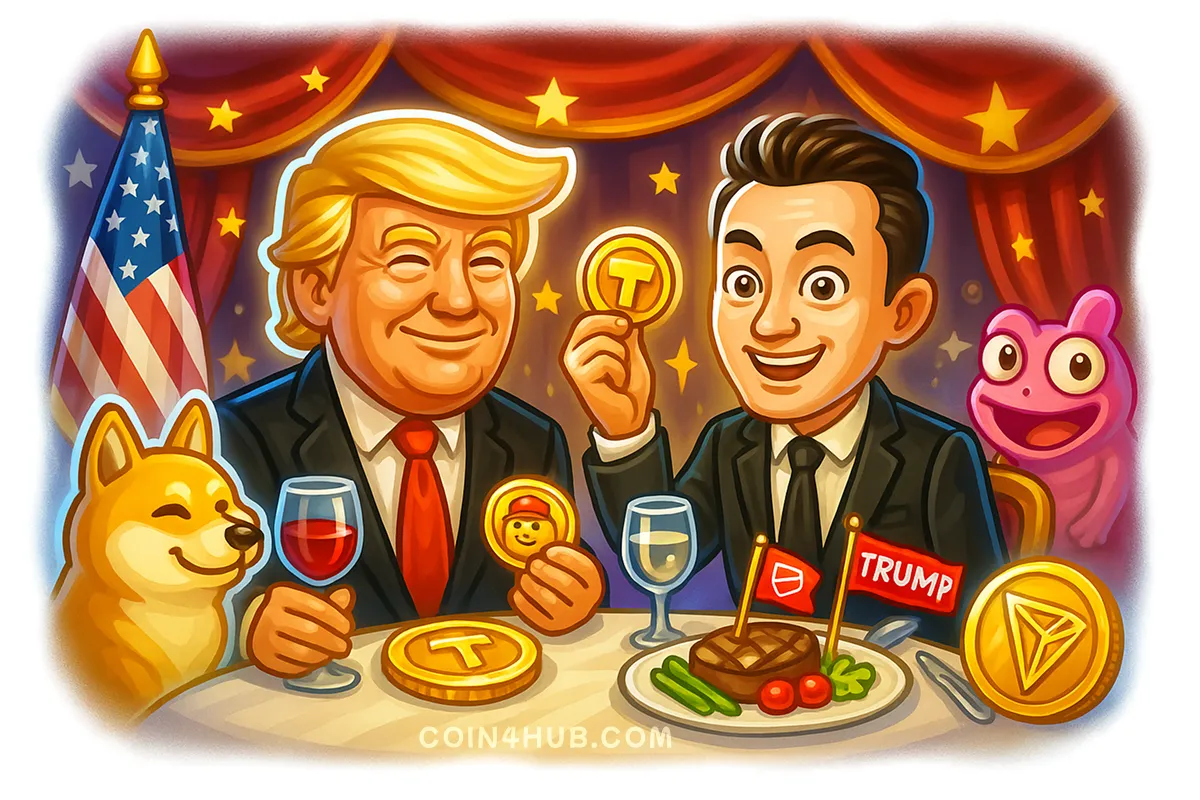In a remarkable shift that highlights cryptocurrency’s evolving position in American politics, Tron founder Justin Sun recently attended a presidential dinner hosted by Donald Trump for major holders of the TRUMP memecoin. Following this high-profile gathering, Sun emphatically defended the legitimacy of memecoins against critics, declaring they “have merit” as valuable components of the digital asset ecosystem. This development comes as the crypto landscape in the United States experiences a dramatic transformation under the new administration.
“I totally think memecoins have merit,” Sun told CoinDesk in an exclusive post-dinner interview. “It’s just like doing business. Some succeed, some go to zero. That’s entrepreneurship.” This framing places memecoins within the broader context of entrepreneurial ventures, acknowledging the inherent risks while emphasizing their potential for success and innovation.
Sun’s defense came in direct response to skepticism expressed by figures like Barstool Sports founder Dave Portnoy, who described memecoins as essentially “gambling” and questioned their long-term viability. “I get why people like it,” Portnoy said at a Consensus 2025 fireside chat. “It’s a form of gambling, it’s a Ponzi scheme. I don’t mean that in a negative way.”
The contrast between these perspectives highlights the ongoing debate about the legitimacy and utility of memecoins within the broader cryptocurrency ecosystem.
Sun’s recent appearance on American soil marks a significant moment in his relationship with U.S. regulators and politics. The last time Sun visited the United States, he was serving as Grenada’s World Trade Organization (WTO) ambassador while navigating the challenging regulatory environment created during the previous administration’s crypto crackdown.
Now, Sun finds himself dining with President Trump alongside other major holders of the TRUMP memecoin, celebrating what appears to be a regulatory breakthrough for the cryptocurrency industry. This shift signals a remarkable reversal in crypto’s American fortunes.
According to Sun, the presidential dinner represented more than just a social gathering—it symbolized America’s resurgence as the global hub for cryptocurrency innovation and development. This marks a sharp reversal from the previous administration’s approach, which Sun characterized as a “war on the industry” that drove many crypto firms to consider relocating offshore.
“At the Trump dinner, some supporters told me they were thinking of leaving the U.S. because of the previous administration, moving to places like Hong Kong or Singapore,” Sun revealed. “Even Consensus started holding events outside of the United States.”
The shift in regulatory approach has apparently changed these calculations. “But now they’ve changed their minds. It brings everybody back into the U.S.,” Sun continued, suggesting that America is reclaiming its position as the preferred destination for cryptocurrency entrepreneurs and investors.
Sun’s connection to Trump-affiliated crypto projects isn’t new. It dates back to shortly after the previous election when he made substantial investments in World Liberty Financial tokens. Records indicate Sun purchased up to $75 million worth of these tokens across multiple transactions, demonstrating his early confidence in Trump-aligned digital asset initiatives.
This relationship has flourished during the current administration. In a move that raised eyebrows throughout the crypto community, the Securities and Exchange Commission (SEC) paused a civil fraud case against Sun alongside crypto exchange Binance. The regulatory body also withdrew from or dropped approximately a dozen other cases, signaling a dramatic shift in enforcement priorities.
However, the regulatory landscape remains complex. The SEC filed a fresh civil fraud lawsuit against Unicoin earlier this week, indicating that enforcement actions haven’t completely ceased. Additionally, a Wall Street Journal report revealed that the Department of Justice (DOJ) has been investigating the Tron founder since 2021.
The launch and promotion of the TRUMP memecoin have not been without controversy. Critics from mainstream media outlets have been vocal about potential concerns, with some attempting to draw connections between holders of the token and controversial political movements.
When confronted about these criticisms, Sun took a diplomatic approach. Rather than dismissing or attacking the critics, he emphasized that they have every right to express their views under the First Amendment—a response that acknowledges the importance of free speech while sidestepping direct engagement with the more controversial allegations.
Sun’s defense of memecoins as legitimate financial instruments points to tokens like DOGE and SHIB as examples of success stories that have helped introduce new users to the cryptocurrency ecosystem. He further emphasized that Tron’s goal is to support “every single piece in crypto to grow and become mainstream,” suggesting that memecoins play a vital role in the broader cryptocurrency ecosystem by attracting new users and expanding the market.
As the cryptocurrency landscape continues to evolve under the new administration, the debate around memecoins—their legitimacy, utility, and future—is likely to remain a significant point of contention among industry insiders, regulators, and the broader public.
Source: CoinDesk


Justin Sun’s comparison of memecoins to entrepreneurial ventures is intriguing. It highlights the risks but also the potential innovative returns in the crypto landscape.
Justin Sun’s advocacy for memecoins, illustrated by his TRUMP token defense, underscores a broader acceptance of their potential role and impact within the evolving crypto market landscape.
Justin Sun’s assertion that memecoins like TRUMP token hold legitimate value challenges traditional perceptions but also sparks needed discussion on the evolving nature of value in our digital age. His comparison of memecoins to entrepreneurial ventures recognizably highlights the risk-reward dynamics inherent in the crypto industry, an aspect that shouldn’t be overlooked when discussing their legitimacy and potential contributions to innovation and market diversification.
Justin Sun’s comparison of memecoins to entrepreneurship is compelling. It acknowledges risks while highlighting their disruptive potential and role in innovation within the crypto sector.
Justin Sun’s comparison of memecoins to entrepreneurship underlines a crucial perspective on risk and innovation within the crypto industry, potentially reshaping public opinion on their legitimacy.